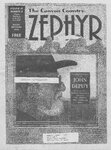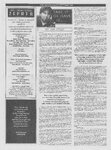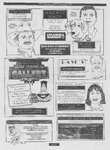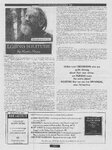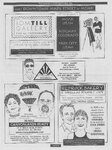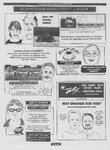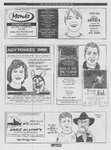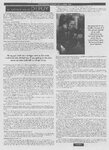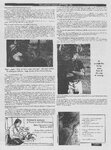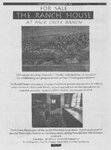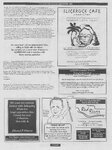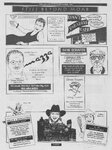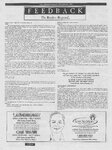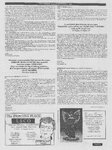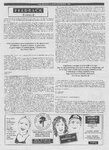| OCR Text |
Show E13 ZEPHYR/AUGUST-SEPTEMBER 2006 working out waysin which The Others can share private holdings. Even in the west where public lands and big parks, forests and wilderness areas seem to be in oversupply, they are not, if we are serious about conservation and restoration. One fact about human history to keep in mind as a sort of vivid background for thinking about nature is that, unlike most organisms who are quite choosy about their own niches, we humans roam the entire planet insisting that we can live anywhere, even Antarctica. The downside is huge importations of materials from elsewhere to support our lives in places where as naked animals we would die. A colleague, Charlotte Meyer (emeritus, Edgewood College) has looked with care at Henry Thoreau's thoughts when he found himself beyond the reach of the last outposts of civilization, high on the rugged and rock-bound slopes of Mount Ktaadn. He seems to be saying that there are places on this earth where we do not belong. Charlotte writes, "On the barren mountaintop he feels fear not because nature is ‘other’, but because humankind like other animals has a natural habitat, and it is not the barren mountaintop." And as a sort of coda to that thought, she adds, "But he could never . even have imagined the commodification of nature to come -- the rich matron onan Alaska cruise boarding a helicopter to land on a glacier to be helped onto a waiting dogsled for a . 10-minute ride." (1) Iknow some Zephyr readers have a different takes on humanity and the earth. There are __ those inclined to think that loss of species -- like, who cares about Orange Crowned Warblers? -- is not that big a deal. We can agree to disagree. Here's one of my disagreements: None of us knows for sure which loss of species will trigger bigger losses - that will cascade and reach you and me and everybody else. Here's another: if you go out and get really acquainted with an Orange Crowned Warbler or, let's say, a Scissor-tailed Flycatcher, you might experience ee new. I'm not saying that would happen, but it might. LOSING SOLITUDE By Martin Murie HABITATS t I looked it up. Exurb: "A region generally semirural, beyond the suburbs of a city, inhabited largely by persons in the upper-income group.” Webster's New Universal Dictionary. HENRY THOREAU, AGAIN He spent a good part of his life writing and lecturing, trying to get people to take nature seriously. Now, about 150 years after his death, we can safely say that he is as relevant today as in his own time. Why? Because he was so continually conscious of his society, his fellow American empire builders, what they did, how they lived. I keep finding evidence that Henry had an unusual capacity to find new tangents in his thinking life. A full-of-oddthoughts adventurer. Listen to him musing as he and his brother stand on a dam, knowing it blocks return of the shad to their spawning grounds. "I for one am with thee (the shad), and who knows what may avail a crow-bar against that Billerica dam?" In a field study in Sonoma county, California, orange-crowned warblers and Hutton's vireos occurred in higher frequency in relatively ul ndisturbed areas than in urban and exurban places. That's to be expected. The surprise was that these two species were not only less numerous in suburban and exurban places, b ut their frequencies were practically identical in the two areas. In other words, more space between houses in exurbia does not necessarily exempt them from disruption of habitats that can, at least in some cases, equal the typical disruption created by ordinary suburb an sprawl. This study is cited and illustrated in Corridor Ecology, anew book just out from Island Press and authored by J. Hilty, W.Lidicker Jr and Adena Merenlender. The bo ok is a model of skillful explication of scientific findings that neither bogs us down in specialist language nor condescends by Unlike most ORGANISMS who are quite choosy about their own niches, we HUMANS roam skirting complex issues of theory and practice. Unusual care is taken in definitions of terms, the entire planet even everyday terms that we all think we know are given a fresh gloss to fit them into the ee purposes of the book. In the blurb on the back cover George Schaller says that it INSISTING that we can live ANYWHERE, even Antarctica. is "an essential resource for everyone concerned with landscape ecology." [have to add that landscape ecology has to be of concern to any and all of us who want to see some sanity restored to the way we treat the earth. That means y u and me, right? Ecologists warn that a few bird studies do not make for sweeping statements, and this is true, but there is more to the story. Exurbs, in addition to their intrinsic on-site characteristics -- high road density, drainage fields, water supply structures and so on -- are also one of the human- caused breakups of natural communities into smaller pieces, along with clearcuts, fire containment breaks and roads, oil and methane drilling, coal mines that remove mountain tops or chew up sage-grasslands, et cetera. The full array of consequences are not fully investigated; probably we will never hav e the entire picture, but some are well established, such as the disruption of habitats of far-ra nging animals: bears, wolves, African and Asiatic lions, tigers, wolverines, mountain lions, elephants, jaguars et al. Most species don't space themselves evenly acros s a landscape, they inhabit in a more fine-grained way, associating with plants, animals, soi ils, slope exposure and a host of other environmental variables to which they are adapted. Human intervention has drastically broken these arrangements. We face a worldwide situs ation now where restoration of animal and plant communities can no longer be confined to manipulation of public lands, nor are parks and wilderness set-asides adequate. The creatior n of landscape scale connectivities will be necessary, such. as the Yellowstone to Yukon Eco system proposal. What this means is “NOW AVAILABLE BREAKOUT ANOVELBY MARTIN MURIE ORD In Boothbay Harbor, Maine in mid June, a conference dedicated to discussion of Thoreau and Rachel Carson. I soaked up a good supply of thoughtful and provocative presentations that showed a deeper awareness than previous meetings of this sort, of the traumas we face in these times of ours, another reason why Henry Thoreau speaks so clearly to us today, his time on earth being the agony of tolerating slavery in the land of the free, and the complacency of citizens, and the approach of war. I had a chance to give a brief spiel on Henry, ending it with quotations from Wes Jackson, founder of The Land Institute and a fine writer about land and being on the land, and Rachel Carson, of Silent Spring fame. Here's Wes: "So here we are at a rare place at a rare moment, embedded within ecosystems within the ecosphere, the only home we have known, and we're screwing it up. Why do we do it? Is it dumbness? Yes. Is it arrogance? Yes. Is it greed? Yes. It is all of the above and more if we could think of enough negative terms. Is it inevitable? Finally,a hopeful No! But a conceptual revolution 1 is necessary, and this time a moral one, because it's perceived by us as necessary." (2) ER SIGNED COPIES DIRECT FROM MARTIN MURIE: LO SING SOLITUDE: A coer Western. Developers invade a Send your order to: MARTIN MURIE owtown....$14.95 Mw NDSWEPT: Birdwatchers Ga biker Gat Montana eangle with, orporation extremists in Medicine Bow, Wyoming... $14.95 ie S WAY: Environmentalists labeled ‘terrorists, ‘keepa chuggin’ on the Quebec/New Y ork border..$12 REI TREE MOUSE CHRONICLES: Forest animals on arin 470 CR 12 North Bangor, NY C A cross continent struggle _to save people and _ other endangered species. i Order direct from Martin Murie 12966 ae SEI IOUSLY INSISTENT: 80 papages Sof activist critique. 7. 00 Plus Postage---$2.20 for the first book, $1.00 for the | (Bee a or email at: sagehen@westelcom.com |
